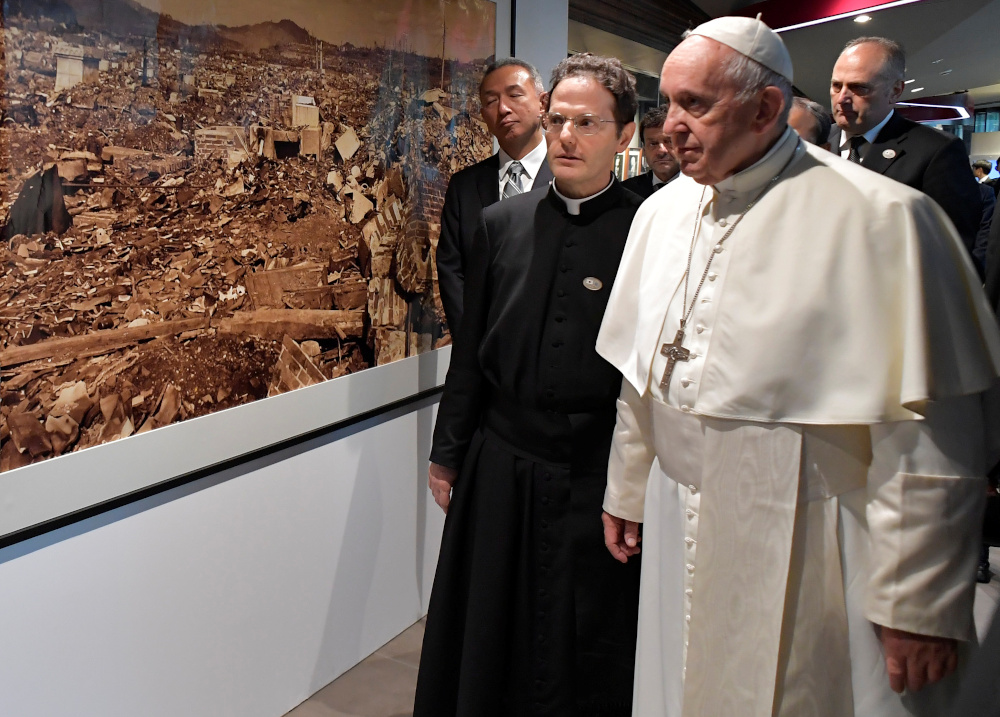
Pope Francis walks by a photo showing the destruction of an atomic bomb during a visit to the Jesuit-run Sophia University in Tokyo Nov. 26, 2019. (CNS photo/Vatican Media via Reuters)
Pope Francis laments in his message for 2020's World Day of Peace that the human community "bears the scars of ever more devastating wars and conflicts," calling on Christians to reject systems of security, such as nuclear deterrence, built on fear of others.
In the message, released Dec. 12, the pontiff also ties together his frequent call for global nuclear disarmament with his pleas for a more just economic system and better protection of the environment and natural resources.
"Every war is a form of fratricide that destroys the human family's innate vocation to brotherhood," the pope writes in the text, which will be officially sent out Jan. 1, the Catholic feast day for the Solemnity of Mary, Mother of God.
Mentioning his recent trip to Japan, where the pontiff visited the nuclear-bombed cities of Hiroshima and Nagasaki, Francis warns that world powers seek to create "a false sense of security sustained by a mentality of fear and mistrust."
"Mistrust and fear weaken relationships and increase the risk of violence, creating a vicious circle that can never lead to a relationship of peace," states the pope. "Even nuclear deterrence can only produce the illusion of security."
"The desire for peace lies deep within the human heart, and we should not resign ourselves to seeking anything less than this," he writes.
Francis' message for the World Day of Peace is the 53rd prepared by a Catholic pontiff. It carries the theme: "Peace as a journey of hope: Dialogue, reconciliation, and ecological conversion."
Pope Paul VI first dedicated the Solemnity of Mary to world peace in 1967, and each feast since 1968 has seen release of a papal message.
Cardinal Peter Turkson, the head of the Vatican's Dicastery for Promoting Integral Human Development, said at a press conference releasing the message that Francis wanted to tell people with his message for 2020 that peace is not a utopian ideal, but something for which everyone can work towards.
Fr. Bruno Duffe, the dicastery's secretary, highlighted the effect of the visit to Japan on Francis' understanding of the world's need for peace.
"Peace and international stability are incompatible with attempts to build up threats of mutual destruction or total annihilation," said Duffe, referring to governments' continuing possession of nuclear weapons.
"Peace appears today more than ever as a great challenge," said the priest. "Because the interests at stake … are numerous and conflicting."
Advertisement
Francis' message unfolds over five brief points. The pope addresses nuclear issues in the first two points, followed by global economic injustice in the third point and the ecological crisis in the fourth. The fifth is dedicated to the need for hope, and to build a culture of "fraternal encounter."
Opening the fourth point on ecological issues, the pontiff quotes from a point in his 2015 encyclical Laudato Si', in which he said humanity has not been "faithful to the treasures of wisdom which we have been called to protect and serve."
"Faced with the consequences of our hostility towards others, our lack of respect for our common home or our abusive exploitation of natural resources -- seen only as a source of immediate profit, regardless of local communities, the common good and nature itself -- we are in need of an ecological conversion," Francis states in the peace message.
"We need to change the way we think and see things, and to become more open to encountering others and accepting the gift of creation, which reflects the beauty and wisdom of its Creator," he says.
Francis' choice to focus on several issues in his 2020 peace message is a bit of a break from previous years, when the pontiff primarily focused on one matter at a time.
The 2017 message, for example, was primarily on non-violence as a political strategy, and the 2015 message centeredon the suffering of victims of human trafficking.
The passage on ecological issues in the 2020 message, though brief, is being released just a day before the scheduled conclusion of COP 25, the annual United Nations climate change summit held this year in Madrid.
In an earlier letter to the climate conference, Francis railed against the "weak" awareness of the urgency to address climate change now as illustrated by the gap between words and actions.
Turkson also briefly addressed environmental matters directly during the Dec. 12 press conference.
Asked by a journalist if Swedish teen activist Greta Thunberg could be considered a "model" of the pope's call for an ecological conversion, the cardinal responded: "I would say that she is a great witness for the church's teaching on care for the environment."
[Joshua J. McElwee is NCR Vatican correspondent. His email address is jmcelwee@ncronline.org. Brian Roewe, an NCR staff writer, contributed to this report.]








